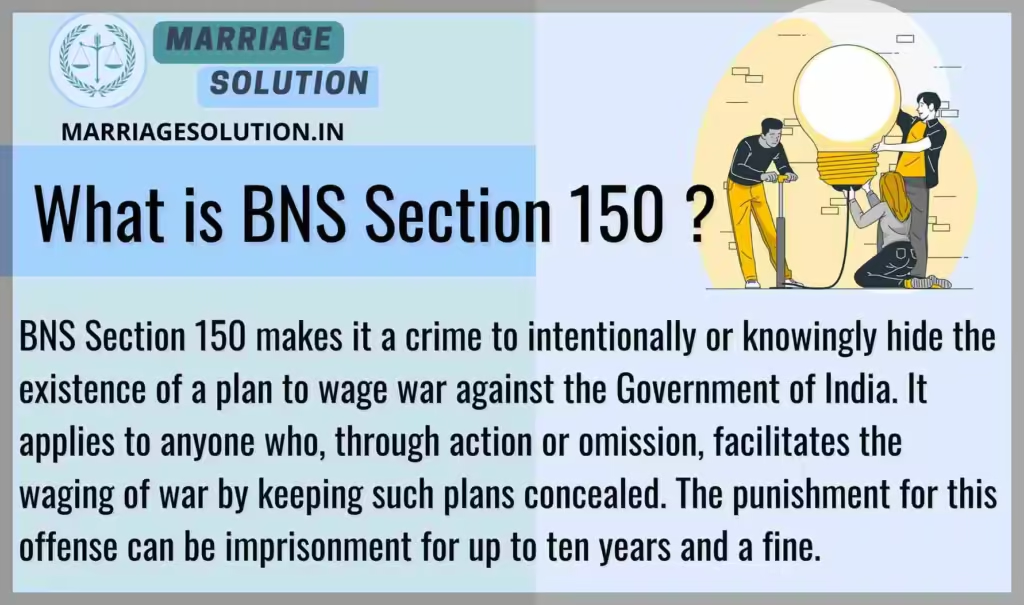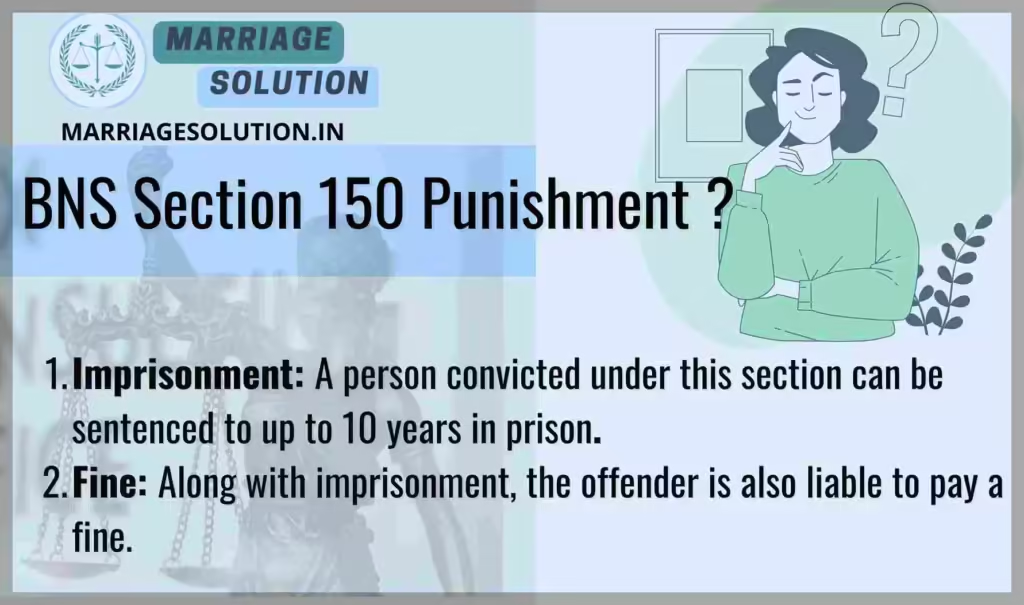Introduction of Section 150 BNS
Section 150 BNS makes it a crime to conceal or fail to disclose plans to wage war against the Government of India. This law applies to both active concealment (deliberately hiding information) and omissions (failing to report knowledge). Even if a person is not directly involved in rebellion or war, simply keeping such information secret with the knowledge that it could help rebels is punishable. The punishment includes imprisonment of up to 10 years and a fine, reflecting the seriousness of safeguarding national security.
The Bharatiya Nyaya Sanhita (BNS) Section 150 replaces the old Indian Penal Code (IPC) Section 123.
- Introduction of Section 150 BNS
- What is section 150 of BNS ?
- Under Section 150 of the bns act 2023
- Why Section 150 is Important
- Section 150 BNS Overview
- BNS 150 Punishment
- BNS 150 bailable or not ?
- Comparison Table – BNS Section 150 vs IPC Section 123 (Old Law: Concealing Plans to Wage War) .
- BNS Section 150 FAQs
- Conclusion
- Need Legal Support?
What is section 150 of BNS ?
BNS Section 150 makes it a crime to intentionally or knowingly hide the existence of a plan to wage war against the Government of India. It applies to anyone who, through action or omission, facilitates the waging of war by keeping such plans concealed. The punishment for this offense can be imprisonment for up to ten years and a fine.

Under Section 150 of the bns act 2023
Whoever, by any act or illegal omission, conceals the existence of a plan to wage war against the Government of India, intending by such concealment to facilitate, or knowing it to be likely that such concealment will facilitate, the waging of such war, shall be punished with imprisonment of either description for a term which may extend to ten years, and shall also be liable to fine.
Explanation of Section 150
Section 150 punishes the concealment of plans to wage war against the Government of India. This law ensures that no one helps rebellion or war efforts by hiding crucial information.
- Concealing War Plans → Hiding knowledge about preparations or designs to wage war is itself a crime.
- Act or Omission → Both actively hiding information or failing to report it are punishable.
- Intention or Knowledge → Even if a person does not intend to help rebels, but knows their silence or concealment will assist, they are guilty.
- Punishment → Imprisonment up to 10 years, plus fine.
- Offense Classification:
- Cognizable → Police can arrest without warrant.
- Non-bailable → Bail is not easily granted.
- Non-compoundable → Cannot be privately settled.
- Tried by Court of Session → Handled in higher courts due to seriousness.
Key Elements of Section 150
- Concealment = Crime → Hiding war plans is treated as abetting war.
- Covers Acts & Omissions → Both deliberate hiding and failure to inform authorities are punishable.
- Knowledge Matters → If you know your concealment can help war efforts, you’re guilty.
- Punishment → Up to 10 years imprisonment + fine.
- Cognizable → Police can act swiftly without a warrant.
- Non-bailable → Reflects the seriousness of the crime.
- Non-compoundable → Cannot be withdrawn or compromised.
- Court of Session Trial → Ensures strict judicial handling.
- Protects National Security → Prevents rebellion by making concealment itself illegal.
- Stops Indirect Support → Even passive support through silence is criminalized.
Examples of BNS Section 150
Example 1 – Failure to Report:
A villager discovers that a rebel group is planning to attack government offices but chooses to stay silent.
Guilty under Section 150 for concealing war plans.
Example 2 – Active Concealment:
An individual finds weapons hidden in a warehouse meant for an armed rebellion but decides not to inform authorities.
Guilty of concealment under Section 150, punishable with up to 10 years in prison.
Why Section 150 is Important
- Strengthens National Security → Prevents rebels from getting indirect help.
- Targets Silence & Secrecy → Even failing to report plans is treated as a serious crime.
- Deterrent Effect → Citizens and insiders think twice before hiding information.
- Closes Loopholes → Covers omissions, not just direct participation in war.
Section 150 BNS Overview
BNS Section 150 makes it a crime to hide, conceal, or fail to reveal any plan or design to wage war against India. If a person, through their actions or omissions, keeps this information secret with the intention of helping the war effort or knowing that it might help in waging war, they can be punished. The punishment for this offense is up to 10 years in prison and a fine.
10 Key Points of BNS Section 150 in Detail
- Concealment of Plans to Wage War
The core of BNS Section 150 is the act of hiding or concealing any plan or design aimed at waging war against the Government of India. This includes keeping secret any information that could aid in the preparation for war, making it easier for a rebellion or conflict to occur. - Includes Both Actions and Omissions
This section covers not just active concealment but also cases where a person knowingly omits to reveal such plans. For example, if someone knows about a plan but fails to report it, they are still guilty under this section. - Facilitating the Waging of War
If the concealment of such plans makes it easier or more likely that war will occur, then the person concealing the plan is seen as facilitating or helping the war effort. This is a serious offense because it supports the act of waging war against the state. - Intent to Help the War Effort
The offense includes situations where the person intentionally hides the plan with the goal of aiding the war effort. Even if the person doesn’t directly participate in the war, their concealment of information helps those who are preparing for it. - Knowledge That Concealment Will Help the War
The law also applies when a person may not directly intend to help the war effort but knows that their concealment will likely assist in making the war happen. This means that someone who is aware their actions are indirectly helping is still guilty. - Punishment
The punishment for this offense is imprisonment for up to 10 years. The person can also be fined. The severity of the punishment reflects the seriousness of the offense, as hiding plans to wage war can have devastating consequences for national security. - Cognizable Offense
BNS Section 150 is a cognizable offense, meaning the police have the authority to arrest the person without a warrant. This allows for quick action when there is suspicion of such a serious crime. - Non-Bailable Offense
It is a non-bailable offense, which means that the accused cannot easily get bail. The court will carefully assess the case, and release on bail will depend on the seriousness of the offense and the evidence. - Non-Compoundable Offense
The offense is non-compoundable, meaning that the case cannot be settled or compromised between the parties. Once charged, the legal process must be followed through the courts. - Trial by Court of Session
Cases under BNS Section 150 are triable by a Court of Session, which handles serious offenses. The trial is conducted under the supervision of higher judicial authorities due to the gravity of the crime.
Examples of BNS Section 150
- Example 1:
A person learns that a group is planning an armed rebellion against the Government of India. Instead of informing the authorities, they keep this information secret, hoping the rebellion will succeed. This person is guilty of concealing a plan to wage war under BNS Section 150. - Example 2:
Someone discovers a hidden stash of weapons intended for use in a war against the government but does nothing to inform the police or relevant authorities. By not reporting it, they a
BNS 150 Punishment
Imprisonment: A person convicted under this section can be sentenced to up to 10 years in prison.
Fine: Along with imprisonment, the offender is also liable to pay a fine.

BNS 150 bailable or not ?
BNS Section 150 is a non-bailable offense. This means that getting bail for such an offense is difficult, and the decision will be at the discretion of the court.
Comparison Table – BNS Section 150 vs IPC Section 123 (Old Law: Concealing Plans to Wage War) .
| Section | What it Means | Punishment | Bail | Cognizable? | Trial By |
|---|---|---|---|---|---|
| BNS Section 150 | Concealing or failing to disclose plans to wage war against the Government of India — includes both active hiding and omissions when such concealment facilitates or is likely to facilitate war. | Imprisonment up to 10 years, and fine. | Non-bailable | Cognizable | Court of Session |
| IPC Section 123 (Old) | Earlier provision penalizing concealment of plans to wage war against the Government of India; focused on hiding existence of such designs (less explicit about omissions). | Imprisonment up to 10 years, and fine (same maximum as BNS). | Non-bailable | Cognizable | Court of Session |
BNS Section 150 FAQs
What does BNS Section 150 cover?
It covers the offense of hiding plans to wage war against the Government of India.
What is the punishment under BNS Section 150?
The punishment can be up to 10 years of imprisonment and a fine.
Is BNS Section 150 bailable?
No, it is a non-bailable offense.
Who tries cases under BNS Section 150?
Cases under this section are tried by a Court of Session.
Can BNS 150 this offense be compromised?
Can this offense be compromised?
Conclusion
Section 150 of the BNS acts as a preventive safeguard for India’s sovereignty. It ensures that silence or secrecy does not indirectly assist those plotting war against the Government. By punishing both acts and omissions, the law closes gaps that rebels or conspirators might otherwise exploit. As a cognizable, non-bailable, and non-compoundable offense, it ensures strict police powers, limited access to bail, and mandatory trial in the Court of Session. This provision strengthens the nation’s legal framework by making it clear that hiding information about war plans is as dangerous as actively participating in them.
Need Legal Support?
If you’re facing court proceedings, marriage-related issues, or any legal matter, our team at Marriage Solution – Lawyer Help is ready to guide you. Just complete our easy online enquiry form, and we’ll connect you with the right legal assistance tailored to your needs..
Finished with BNS 150 ? Continue exploring the next provisions of the Bharatiya Nyaya Sanhita (BNS), 2023. Each section includes explanations, examples, and plain-language breakdowns for easy understanding.
- 151 BNS : Assaulting President, Governor, etc., with intent to compel or restrain the exercise of any lawful power.
- https://marriagesolution.in/bns_section/151-bns/
- Section 152 BNS : Acts endangering sovereignty unity and integrity of India.
- https://marriagesolution.in/bns_section/section-152-bns/
- BNS 153 : Waging war against Government of any foreign State at peace with the Government of India.
- https://marriagesolution.in/bns_section/bns-153/
- Section 154 BNS : Committing depredation on territories of foreign State at peace with the Government of India.
- https://marriagesolution.in/bns_section/section-154-bns/
- BNS 155 : Receiving property taken by war or depredation mentioned in sections 153 and 154 .
- https://marriagesolution.in/bns_section/bns-155/
Full IPC Section List: https://marriagesolution.in/ipc-section-list
All Indian Law & Blogs: https://marriagesolution.in/indian-law/
Full BNSS Section List: https://marriagesolution.in/bnss_section-list
